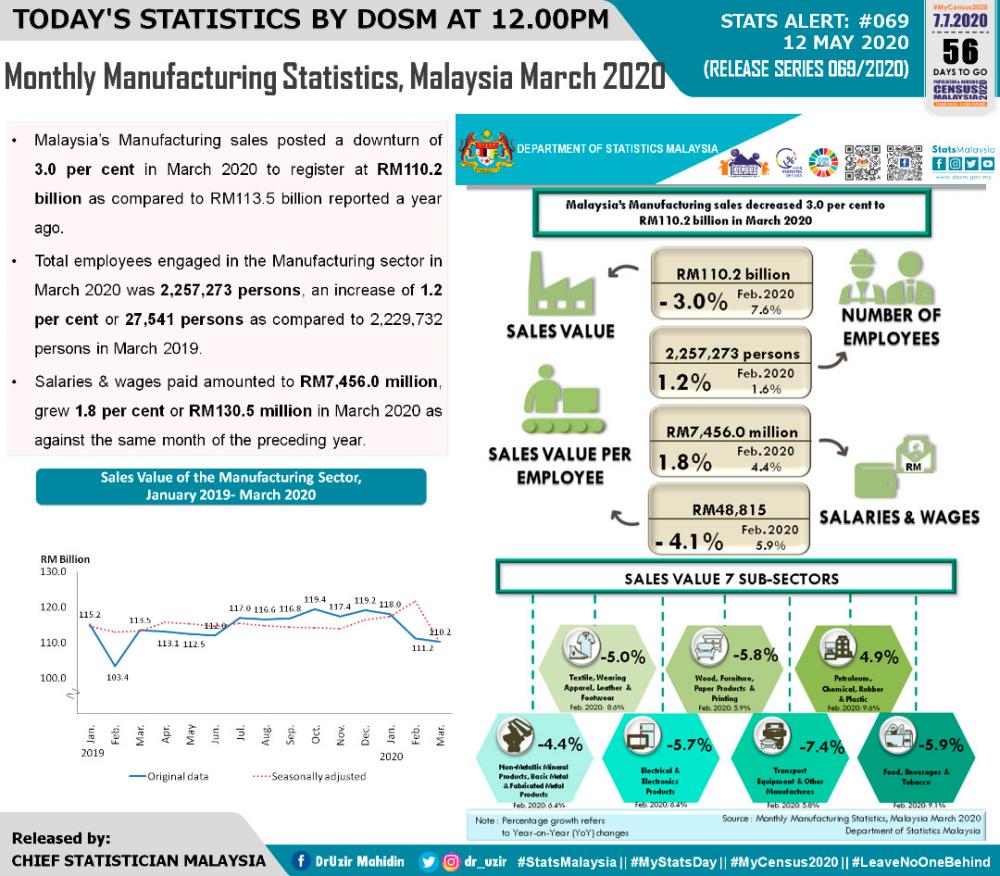PETALING JAYA: Malaysia’s manufacturing sales fell 3% in March 2020 to RM110.2 billion as compared to RM113.5 billion a year ago, due to the decrease in transport equipment & other manufactures products (-7.4%), food, beverages & tobacco products (-5.9%) and electrical & electronics products (-5.7%).
Month on month, sales plunged 0.9% (RM1.1 billion) while on seasonally adjusted terms, sales decreased 9.5%.
Chief statistician Malaysia Datuk Seri Mohd Uzir Mahidin said the number of employees engaged in the manufacturing sector in March 2020 was 2.26 million persons, an increase of 1.2% as compared to 2.23 million persons in March 2019.
Salaries & wages paid amounted to RM7.46 billion, up 1.8% in March 2020 as against the same month of the preceding year.
Simultaneously, the sales value per employee declined 4.1% to RM48,815 as compared with the same month in 2019. Meanwhile, the average salaries & wages per employee was RM3,303 in March 2020.
In the first quarter 2020, manufacturing sales grew 2.2% to RM339.4 billion as compared to the same period of 2019. The number of employees engaged during the period grew 1.2% to 2.26 million persons while salaries & wages paid increased 3.4% to RM22.7 billion. The sales value per employee rose 1% to RM150,368.
Meanwhile, Malaysia’s Industrial Production Index (IPI) dropped 4.9% in March 2020 as compared with the same month of the previous year, contributed by the decrease in all indices, which were index of manufacturing (-4.2%), index of mining (-6.5%) and index of electricity (-7%).
Mohd Uzir said on a year-on-year basis, the manufacturing sector output dropped 4.2% in March 2020 after increasing 6.2% in February 2020.
The major sub-sectors contributing to the decrease in manufacturing sector in March 2020 were electrical and electronics products (-5%), non-metallic mineral products, basic metal and fabricated metal products (-9.8%) and food, beverages and tobacco (-9.9%).
The mining sector output dropped 6.5% in March 2020 as compared to the same period of the previous year, due to the decrease in natural gas index (-6%) and crude oil and condensate index (-7.1%).
The electricity sector output decreased 7% in March 2020 as compared to the same month of the previous year.
The IPI for the first quarter 2020 grew 0.4% as compared to the same period of the previous year, contributed by the increase of 1.3% in manufacturing index. Meanwhile, electricity index and mining index recorded a reduction of 0.4% and 1.8% respectively.
In a report, BIMB Securities Research said the IPI decline is the sharpest seen in nearly a decade as curbs imposed to contain the coronavirus pandemic severely disrupted activity.
The research house said the pandemic is expected to weigh heavily on the manufacturing industry, given the fact that both supply chain disruption and weak consumer demand are inevitable on the back of travel and movement restriction imposed in many countries.
“We remain cautious as the possibility of a new wave of infection may recur, prolonging the movement restriction or lockdown. As for the external sector, trade activities will remain restrained as cross-border movement restrictions are still intact in majority of the countries, with some factories not operating at full capacity in order to abide to social distancing measures, leading to disruptions in the global supply chain,” it said.
In addition, it noted that it may take anywhere between six to 12 months before demand recovery gains a firmer footing and the global supply chain adjusts to the new normal, further impacting Malaysia’s projected value-added manufacturing growth.













